By Jim Tankersley, Los Angeles Times
Reporting from Washington - The nation’s largest business lobby wants to put the science of global warming on trial.
The U.S. Chamber of Commerce, trying to ward off potentially sweeping federal emissions regulations, is pushing the Environmental Protection Agency to hold a rare public hearing on the scientific evidence for man-made climate change.
If EPA is truly committed to scientific integrity and transparency, then now is the time to prove it. In the circumstances here, those principles require the Agency to agree to resolve the Proposed Endangerment Finding on the record, rather than by an informal policy and political process. The Agency, and the Nation, would be better served by doing so. Accordingly, the Chamber hereby petitions the United States Environmental Protection Agency to resolve its Proposed Endangerment Finding solely on the record of the scientific evidence.
--U.S. Chamber of Commerce EPA Petition, June 23, 2009
Chamber officials say it would be “the Scopes monkey trial of the 21st century”—complete with witnesses, cross-examinations and a judge who would rule, essentially, on whether humans are warming the planet to dangerous effect.
“It would be evolution versus creationism,” said William Kovacs, the chamber’s senior vice president for environment, technology and regulatory affairs. “It would be the science of climate change on trial.” The goal of the chamber, which represents 3 million large and small businesses, is to fend off potential emissions regulations by undercutting the scientific consensus over climate change. If the EPA denies the request, as expected, the chamber plans to take the fight to federal court.
The EPA is having none of it, calling a hearing a “waste of time” and saying that a threatened lawsuit by the chamber would be “frivolous.” EPA spokesman Brendan Gilfillan said the agency based its proposed finding that global warming is a danger to public health “on the soundest peer-reviewed science available, which overwhelmingly indicates that climate change presents a threat to human health and welfare.”
Environmentalists say the chamber’s strategy is an attempt to sow political discord by challenging settled science—and note that in the famed 1925 Scopes trial, which pitted lawyers Clarence Darrow and William Jennings Bryan in a courtroom battle over a Tennessee science teacher accused of teaching evolution illegally, the scientists won in the end.
The chamber proposal “brings to mind for me the Salem witch trials, based on myth,” said Brenda Ekwurzel, a climate scientist for the environmental group Union of Concerned Scientists. “In this case, it would be ignoring decades of publicly accessible evidence.” (Update: See email to Ekwurzel by Chemical Scientist Dr. Brian G. Valentine of the U.S. Department of Energy and professor at University of Maryland on Climate Depot here).
In the coming weeks, the EPA is set to formally declare that the heat-trapping gases scientists blame for climate change endanger human health, and are thus subject to regulation under the Clean Air Act. The so-called endangerment finding will be a cornerstone of the Obama administration’s plan to set strict new emissions standards on cars and trucks.
The proposed finding has drawn more than 300,000 public comments. Many of them question scientists’ projections that rising temperatures will lead to increased mortality rates, harmful pollution and extreme weather events such as hurricanes.
In light of those comments, the chamber will tell the EPA in a filing today that a trial-style public hearing, which is allowed under the law but nearly unprecedented on this scale, is the only way to “make a fully informed, transparent decision with scientific integrity based on the actual record of the science.”
Most climate scientists agree that greenhouse gas emissions, caused by the burning of fossil fuels and other human activities, are warming the planet. Using computer models and historical temperature data, those scientists predict the warming will accelerate unless greenhouse gas emissions are dramatically reduced.
“The need for urgent action to address climate change is now indisputable,” said a recent letter to world leaders by the heads of the top science agencies in 13 of the world’s largest countries, including the head of the U.S. National Academy of Sciences.
The EPA’s endangerment finding for greenhouse gases, as proposed in April, warned that warmer temperatures would lead to “the increased likelihood of more frequent and intense heat waves, more wildfires, degraded air quality, more heavy downpours and flooding, increased drought, greater sea level rise, more intense storms, harm to water resources, harm to agriculture, and harm to wildlife and ecosystems.”
Critics of the finding say it’s far from certain that warming will cause any harm at all. The Chamber of Commerce cites studies that predict higher temperatures will reduce mortality rates in the United States. Read more here.
--------------------
Meanwhile see “The White House muzzles a global warming skeptic” in this Washington Times story called Bury the Messenger.
If you can’t muzzle the whistleblower, try to marginalize him. That seems to be the strategy of the Obama administration, which is showing that its commitment to liberal ideology trumps its pledge to foster open government.
In June, the Competitive Enterprise Institute made waves by releasing internal e-mails from the Environmental Protection Agency. In those messages, a top administrator told a key researcher that the researcher’s new report would not be released. Why? Because it does “not help the legal or policy case” for a controversial decision to treat global warming as a health hazard. In short, because researcher Alan Carlin’s conclusions differed from the administration’s political agenda, his research was ignored.
Mr. Carlin, who holds a doctorate in economics with an undergraduate degree in physics, examined numerous studies on global warming. His scorching message to his political bosses at EPA: “I have become increasingly concerned that EPA has itself paid too little attention to the science of global warming. EPA and others have tended to accept the findings reached by outside groups… as being correct without a careful and critical examination.” That examination shows, Mr. Carlin said, that “available observable data… invalidate the hypothesis” that humans cause serious global warming.
With the administration so heavily invested in a regulatory scheme to combat supposed warming, this message was far from welcome. Hence the effort to bury the report, an effort that was thwarted when Mr. Carlin posted the report on a personal Web site.
The administration struck back. Mr. Carlin works for the EPA’s National Center for Environmental Economics. On Friday, Inside Washington Publishers reported that “Obama EPA officials are said to be considering scrapping” the center’s role in scientific analysis. Never mind the reality that doing so would undermine the entire reason for its existence, namely (citing the article) “researching environmental health issues to improve risk assessment data used in economic analyses for [new regulatory] rules.”
If the office can’t analyze the science in order to determine a regulation’s economic effects, it won’t have any basis for figuring out those effects. Hiding scientific research is not what Americans expect from a president who boasted that his administration would “restore science to its rightful place.” And for a president who promised to “strengthen whistleblower laws,” this attempt to marginalize a true whistleblower smacks of insincerity. Its implications for economic and environmental policy are dangerous.
See this video response by Carlin to this EPA action (below and enlarged here):
Read much more on this and why its the global warminista’s greatest fear here.
By Timothy P. Carney, Washington Examiner
“The intersection between GE’s interests and government action is clearer than ever,” General Electric Vice Chairman John G. Rice wrote in an Aug. 19 e-mail to colleagues. Rice was calling on his co-workers to join the General Electric Political Action Committee. “GEPAC is an important tool that enables GE employees to collectively help support candidates who share the values and goals of GE.” The full letter suggests that “share the values and goals of GE” really means “support policies that profit the company.”
Steve Milloy, a pro-free market investor at the Free Enterprise Action Fund, obtained this e-mail and says it reveals General Electric for what it really is. “GE is lobbying to become the biggest rent seeker this country has ever seen,” Milloy told this column. Rent seeking is using government legislation or regulation to generate private profits the free market wouldn’t provide.
“On climate change,” Rice wrote, “we were able to work closely with key authors of the Waxman-Markey climate and energy bill, recently passed by the House of Representatives. If this bill is enacted into law it would benefit many GE businesses.”
Most of all, Waxman-Markey would profit a GE joint venture called Greenhouse Gas Services, which deals in greenhouse gas credits, products that have value only if a cap-and-trade bill like Waxman-Markey passes.
The leaked e-mail shows how tightly GE connects PAC contributions and lobbying efforts. “Our Company is heavily impacted by a number of issues pending in Washington this fall,” Rice wrote.
GE spent more on lobbying in the second quarter of this year than did any other company, according to federal lobbying files. Since 1998, GE has been the king of lobbying expenditures, according to the Center for Responsive Politics, outpacing its runner-up by 40 percent. Last election, GEPAC spent $2.4 million, with a slim majority going to Democrats. So far this year, two-thirds of GEPAC money has gone to Democrats.
Rice’s description of how PAC contributions help the company ("we must also make sure that candidates who share GE’s values and goals get elected to office") belies the true dynamic in political giving, as the rest of the e-mail suggests.
By calling for PAC contributions in the context of GE’s lobbying efforts in coming weeks, Rice is clearly not talking about electing pro-GE candidates in November 2010. He is talking about making current congressman more pro-GE.
If GEPAC was just trying to “make sure that candidates who share GE’s values and goals get elected to office,” why would the PAC give $15,000 each to the Republican and Democratic senatorial campaign committees? Those contributions cancel each other out if they are considered ammunition for allies in electoral battles. But they complement one another if they are considered the ticket price to access with lawmakers.
The recipient list of GEPAC cash also suggests the PAC is more about access to power brokers than support for friendly politicians.
Rep. Charlie Rangel of Harlem received $2,000 from GEPAC. He is not in electoral danger, but he is chairman of the tax-writing Ways and Means Committee. Rep. Henry Waxman of Hollywood also doesn’t need GE’s help getting elected, but the $1,000 from GEPAC might make Waxman, who’s chairman of the Commerce Committee, more amenable to a GE-friendly climate bill or health care reform bill.
Of the six House members who have received more than $4,000 from GEPAC this cycle—all Democrats—only Rep. John Murtha, D-Pa., faces a tough re-election next year, thanks to accusations that he has used his chairmanship of the Defense Appropriations subcommittee to benefit donors and patrons. GE is a top defense contractor.
The other top recipients are all safe incumbents in powerful positions: House Speaker Nancy Pelosi, Budget Committee Chairman John Spratt, House Majority Whip Steny Hoyer, Ways and Means member Richard Neal, who chairs the subcommittee on Select Revenue Measures, and key appropriator Norm Dicks.
The “intersection between GE’s interests and the government’s actions” is plenty crowded. GE is betting on climate change legislation, high-speed rail funding, electric car subsidies, embryonic stem cell grants, expanded federal health care spending, subsidies for renewable energy, defense contracts and continued financial bailouts.
GEPAC pays the tolls to make sure all this traffic gets through.
Read more here.
By Bob Tisdale on Watts Up With That
The Seth Borenstein AP article about the recent high sea surface temperature is misleading. There is a significant difference between what Seth Borenstein reported and what NOAA stated in the July “State of the Climate”.
Borenstein does not clarify that it is a record for the month of July, where NOAA does. NOAA writes, “The global ocean surface temperature for July 2009 was the warmest on record, 0.59C (1.06F) above the 20th century average of 16.4C (61.5F). This broke the previous July record set in 1998.” Refer to Figure 1, which is a graph of SST for July from 1982 to 2009 (NOAA’s ERSST.v3b version).
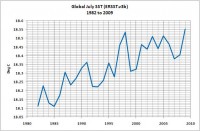
Borenstein readers are told that July 2009 Sea Surface Temperatures (SSTs) were the highest since records began, but that is false. Figure 2 illustrates monthly SSTs from November 1981 to July 2009. I’ve added a red horizontal line to show the July 2009 value.
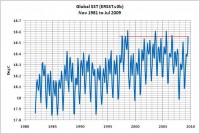
Whether or not July SSTs represented a record is also dependent on the SST dataset. NOAA’s satellite-based Optimally Interpolated (OI,v2) dataset presents a different picture. That dataset clearly shows that July 1998, Figure 3, had a higher SST.
The Borenstein article also claims that Arctic SST anomalies are as high as 10 deg F (5.5 deg C) above average. Wow!! Really??
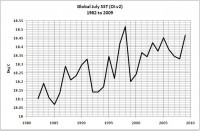
And looking at the monthly OI.v2 data since November 1981, Figure 4, there are numerous months with higher SSTs.
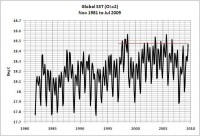
The Borenstein article also claims that Arctic SST anomalies are as high as 10 deg F (5.5 deg C) above average. Wow!! Really??
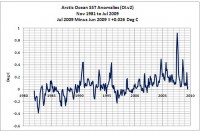
See larger here.
SST anomaly graphs through July 2009 for the Arctic Ocean and other individual oceans can be found at my July 2009 SST Anomaly Update.
To sum up the Borenstein article, it’s factually incorrect in places, and in others, it raises alarmism to ridiculous levels by dwelling on a meaningless statistic, the July SST anomaly of the White Sea. See full post here.
See Anthony’s excellent post on “Diane Feinstein, Turbidity Denier” here.


